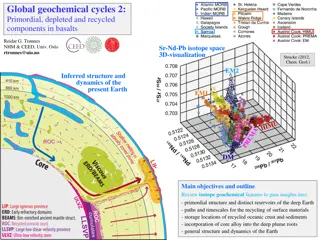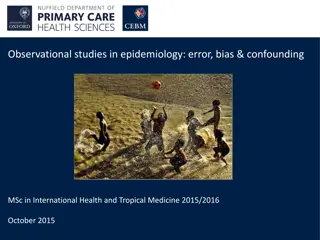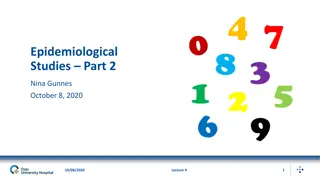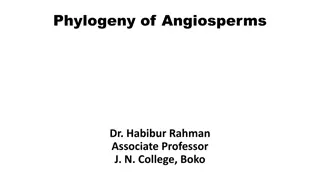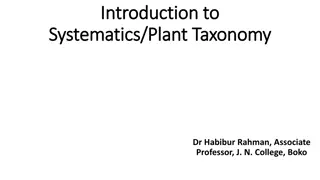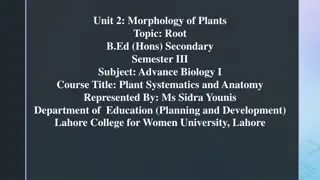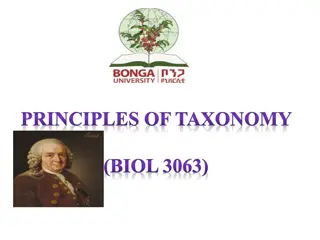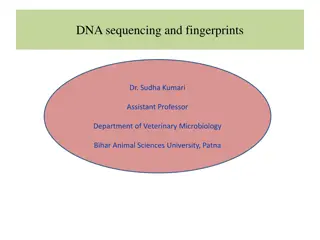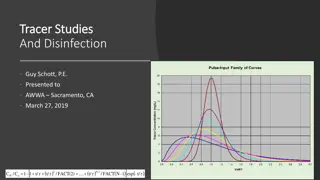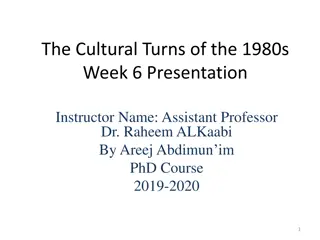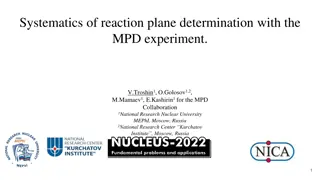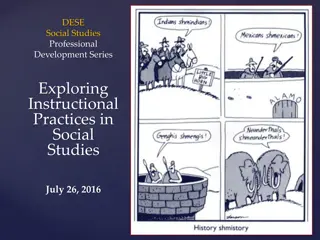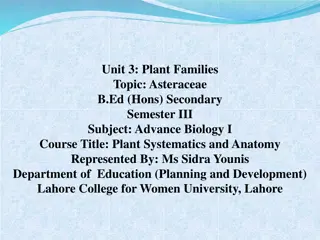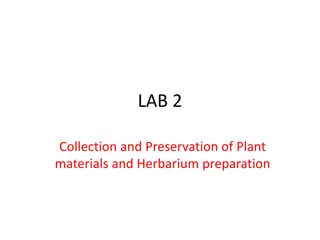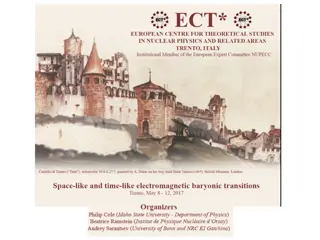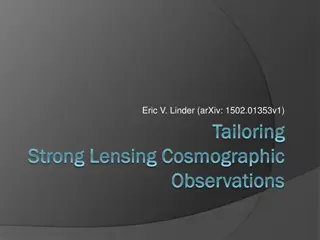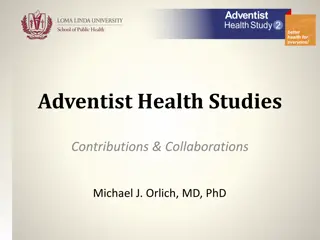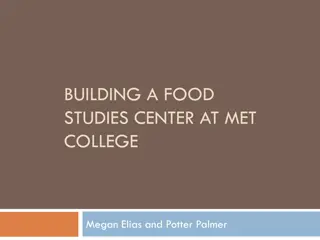Evolution and Plant Systematics Lecture Overview
This lecture outline delves into the concepts of evolution, unity, and diversity of organisms on Earth, covering topics such as fossils, Lamarck and Darwin's theories, adaptation, natural selection, artificial selection, Carolus Linnaeus' systematics, plant evolution, and the demonstration of evolut
5 views • 26 slides
Insights into Earth's Geochemical Cycles and Isotopic Evolution
Explore the primordial, depleted, and recycled components in basalts to understand deep Earth reservoirs, recycling paths, and core-mantle dynamics using isotope geochemistry. Learn about radioactive decay systems, mantle array evolution, and U-Th-Pb systematics in planetary differentiation.
6 views • 30 slides
Remarkable Opportunities in Higher studies after Civil Engineering
Higher studies after Civil Engineering in Tamil Nadu\nCivil engineering stands at the forefront of shaping our physical environment; from the infrastructure we rely on daily to the sustainable development of our cities. Further, pursuing Higher studies after Civil Engineering opens up countless oppo
0 views • 2 slides
Latest Research and Studies on Lung Cancer - Update May 2024
This research update includes information on national recruitment to lung cancer studies, comparison of national vs. regional recruitment, and detailed descriptions of various studies and trials related to lung cancer. The studies cover areas such as treatment advancements, observational studies, ma
2 views • 13 slides
Understanding Observational Studies in Epidemiology
Delve into the realm of observational studies in epidemiology, exploring concepts such as error, bias, and confounding. Discover the significance of various study designs, from case reports to prospective cohort studies, in elucidating associations and establishing causality in non-communicable dise
2 views • 58 slides
Overview of Cohort Studies in Epidemiology
Cohort studies are a type of observational study where a group of healthy subjects is followed over time to investigate relationships between exposures and outcomes. They provide valuable insights into disease development and risk factors, offering advantages like assessing multiple exposures and en
0 views • 21 slides
Overview of Ecological Studies in Epidemiology
Ecological studies in epidemiology involve studying groups of individuals at a population level to examine the correlation between exposure and disease occurrence. While cost-effective and useful for generating hypotheses, ecological studies have limitations, such as the inability to control for con
3 views • 21 slides
Understanding Phylogeny and Evolution in Angiosperms
Phylogeny is the study of evolutionary relationships among organisms, depicted in phylogenetic trees based on shared characteristics. This overview delves into terms like homology, analogy, monophyly, and co-evolution in angiosperms with an emphasis on taxonomy, systematics, and the evolutionary his
1 views • 25 slides
Insights into Plant Taxonomy and Systematics by Dr. Habibur Rahman
This informative content delves into the aims and principles of plant taxonomy and systematics as elucidated by Dr. Habibur Rahman. It covers the significance of taxonomy in identification, classification based on natural affinities, inventory creation, evolution detection, and its integral role in
2 views • 34 slides
Morphological Characters of Roots in Plant Systematics and Anatomy
The morphology of plant roots is essential in understanding plant systematics and anatomy. Roots are categorized into two main groups: Tap Roots and Adventitious Roots. Tap roots directly arise from the seed and can be fibrous, tuberous, conical, fusiform, or napiform. Adventitious roots develop fro
1 views • 7 slides
BSc in Strategic Studies & International Relations at KDU
The Faculty of Defence and Strategic Studies at KDU offers a hybrid BSc degree in Strategic Studies and International Relations to prepare skilled professionals in national security and foreign relations. The program aims to develop theoretical and research skills for analyzing international politic
0 views • 8 slides
Overview of Media Studies Disciplines and Historical Development
Media studies is a multidisciplinary field that explores the content, history, and effects of various media, with roots in the relationship between media and culture. Originating in the 1920s, media studies draws on traditions from social sciences and humanities, incorporating theories from discipli
5 views • 18 slides
Fundamentals of Taxonomy Explained: From Classification to Nomenclature
Taxonomy, derived from Greek roots, encompasses the science of classifying organisms and understanding their variations, evolutionary relationships, and naming conventions. It involves description, identification, classification, and nomenclature of both living and extinct organisms. The practices o
1 views • 39 slides
Understanding DNA Sequencing: Principles, Applications, and Techniques
DNA sequencing plays a vital role in various fields such as research, diagnostics, biotechnology, forensics, and biological systematics. By determining the order of nucleotide bases in a DNA molecule, it helps in understanding genetic sequences, identifying mutations, and completing projects like th
0 views • 17 slides
Understanding Post-Authorisation Safety Studies (PASS) in Pharmacovigilance
Post-Authorisation Safety Studies (PASS) are conducted after a medicinal product is authorized to gather more safety information or assess risk management effectiveness. These studies evaluate the safety and benefit-risk profile of the product, aiding regulatory decision-making. PASS aims to identif
0 views • 4 slides
Understanding Nonexperimental and Quasi-experimental Studies
Nonexperimental and quasi-experimental studies resemble experiments but lack random assignment, making them valuable for group comparisons without establishing causation. This type of research design looks at differences between groups that already exist, focusing on group differences rather than ca
1 views • 35 slides
Understanding Tracer Studies and Disinfection in Water Treatment
Tracer studies play a crucial role in determining hydraulic efficiencies and disinfectant exposure times in water treatment processes. This presentation by Guy Schott covers the purpose of tracer studies, water age distribution, disinfection exposure time, CT disinfection, log inactivation, and more
0 views • 34 slides
The Cultural Turns of the 1980s in Translation Studies
This presentation explores the various cultural turns in Translation Studies during the 1980s, highlighting key scholars such as Snell-Hornby and Even-Zohar. It discusses the linguistic turn, pragmatic turn, and the significance of cultural studies in understanding translation processes, particularl
0 views • 30 slides
Understanding Clinical Trials: Types and Designs
Clinical trials are essential research studies that evaluate new tests and treatments to improve human health outcomes. They involve various phases, designs, and purposes, such as treatment trials, prevention trials, and observational studies. Different types of clinical trial designs include experi
7 views • 18 slides
Breast Cancer Research Updates and Recruitment Data Overview
This document provides updates on breast cancer research, focusing on recruitment data and studies conducted between 2019 and 2023. It includes information on national and regional recruitment to breast cancer studies, SWAG region lead network studies, and opened breast cancer studies in 2022/2023.
0 views • 13 slides
Uganda Stakeholders Meeting on DELIVER and B-PROTECTED Studies - June 19, 2019
Stakeholders in Uganda convened on June 19, 2019, to discuss the DELIVER and B-PROTECTED studies evaluating PrEP and the dapivirine ring in pregnant and breastfeeding women. The discussions included concerns about community involvement, reasons why women may hesitate to join the studies, and the enr
0 views • 9 slides
Systematics of Reaction Plane Determination with MPD Experiment
An investigation into the anisotropic transverse flow in heavy-ion collisions at Nuclotron-NICA energies, focusing on the MPD experiment's capabilities in studying momentum anisotropy and collective expansion effects through sophisticated tracking and particle identification systems. The experiment
0 views • 12 slides
Exploring Social Studies Instructional Practices: Professional Development Series
Join the DESE Social Studies Professional Development Series to delve into instructional practices in social studies. Connect with educators, explore pedagogy, and engage in hands-on activities like the Elephant and Giraffe exercise. Learn from ELA directors, Missouri Writing Project experts, and Ar
0 views • 14 slides
Florida Expressway Authority Cost Savings Study Overview
This presentation outlines the Florida Expressway Authority Cost Savings Study conducted by Cambridge Systematics and the University of South Florida. The study aims to analyze opportunities for cost savings and efficiency improvements among Florida Expressway Authorities by sharing resources. Key f
1 views • 40 slides
Pilot Studies in Advancing Dementia Care: Core Considerations
Pilot studies play a crucial role in exploring interventions, determining necessary modifications, assessing feasibility, and confirming stakeholder acceptance. They help in testing study protocols, assessing data collection procedures, and evaluating outcome measures. Feasibility studies are essent
0 views • 9 slides
Cutting-edge Proton EDM Storage Ring Experiment Insights
Detailed overview of the Proton EDM Storage Ring Experiment by William Morse, highlighting challenges in neutron EDM sensitivity, magic momentum phenomenon in electric fields, and advancements in proton EDM experiment sensitivity. Explore the critical parameters related to axion physics, CP-violatio
1 views • 16 slides
Asteraceae: The Composite Family of Flowering Plants
Asteraceae, commonly known as the Composite family, is a diverse group of plants with over 1,620 genera and 23,600 species worldwide. This family is recognized for its ornamental garden plants like Asters, Chrysanthemums, and Dahlias. With a unique characteristic of flower heads composed of small fl
0 views • 13 slides
Hematological Cancer Clinical Studies Update and Recruitment Statistics
Latest update on hematological cancer clinical studies from the SWAG.Network Haematological Cancer Clinical Advisory Group, including national recruitment data, regional recruitment comparisons, open studies, and sample size information for ongoing studies. This comprehensive update covers a range o
1 views • 14 slides
Choosing Between Observational Study and Experiment in Research
Observational studies involve recording data without interfering with subjects, while experiments impose treatments on subjects to establish cause and effect. A well-controlled experiment is crucial for determining causation, while observational studies can provide quick results at lower costs. Each
0 views • 24 slides
Advancements in Electroweak Precision Physics at Z Pole in CEPC
CEPC is making remarkable progress in electroweak precision physics at the Z pole, aiming for significant improvements in luminosity and precision measurements. Research on W/Z physics, branching ratios, gluon splitting, systematics reduction, and detector enhancements are key focus areas. CEPC expe
0 views • 14 slides
Insights on Presolar Silicates and Magnesium Isotopes
Primitive meteorites contain presolar grains with unique isotopic compositions, paving the way for the study of stardust from stars to laboratories. Ion imaging techniques reveal the abundant presence of presolar silicates, showcasing advancements in in situ studies facilitated by cutting-edge techn
0 views • 17 slides
Plant Collection and Preservation Techniques
Explore the process of collecting and preserving plant materials for herbarium preparation. Learn about the importance of plant documentation, including dry and wet preservation methods. Understand why plant collection is crucial for systematics studies and serving as a reference collection for name
0 views • 25 slides
Advances in Baryon Spectroscopy and Hadronic Matter Studies
Discussions at the meeting focused on interpreting HADES results for e+e- and meson production in hadronic reactions, with studies involving proton, pion, light, and heavy ion beams. The role of time-like electromagnetic transitions, baryon spectroscopy, and connecting hadronic matter studies were e
0 views • 12 slides
Tailoring Strong Lensing Cosmography Observations
The exploration of cosmography involves mapping the general features of the universe to understand its large-scale geometry and kinematics. This study delves into measuring time delay distances, optimizing spectroscopic follow-up, and addressing systematics such as redshift distribution and model sy
0 views • 23 slides
Overview of Selected Problems in Czech Criminal Law
This overview delves into the relationship between the general and special parts of the Czech Criminal Code, the systematics of the special part, and an introduction to various crimes categorized under the special part. It discusses crimes against life and health, freedom and rights, human dignity,
0 views • 51 slides
Understanding Targeted Clinical Investigation in Pharmacovigilance
Targeted clinical investigation plays a crucial role in pharmacovigilance by further evaluating significant risks identified in pre-approval clinical trials. This involves conducting pharmacokinetic and pharmacodynamic studies, genetic testing, interaction studies, and large simplified trials to ass
0 views • 12 slides
Concentration and Minor Requirements for Bachelor of General Studies (BGS)
Bachelor of General Studies (BGS) students at Northwestern State University of Louisiana must complete a concentration consisting of 36 hours, with a minimum of 12 hours at the 3000 and 4000 levels taken at NSU. The popular concentrations are Social Science, Computer & Natural Science, and Arts & Co
0 views • 9 slides
Exploring Pesticide Monitoring and Contamination Studies in Maine
Mary Tomlinson's work with the Maine Board of Pesticides Control includes past studies on groundwater and surface water monitoring, ongoing monitoring initiatives, and future collaborative studies. The State Law mandates residue surveys to identify possible contamination sources and develop a pestic
1 views • 55 slides
Adventist Health Studies Contributions & Collaborations Overview
Adventist Health Studies have made significant contributions to understanding the health and longevity advantages of Seventh-day Adventists, particularly focusing on vegetarian diets and cardiovascular health. With a history spanning over 57 years and various cohort studies, these studies have provi
1 views • 12 slides
Building a Food Studies Center at Met College
Establishing a Food Studies Center at Met College, driven by the merging of Food and Wine courses with Gastronomy programs, aims to integrate hands-on and academic approaches to food studies. Drawing inspiration from existing models like the Culinaria Research Centre and the Center for Regional Agri
2 views • 8 slides

